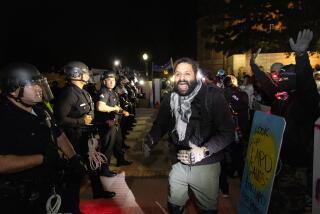Drama Grips Chinese in U.S. : Students Express Sympathy for Protesters in Homeland
- Share via
More than two decades ago, Lin Changsheng was a member of the Red Guard, a Chinese teen-ager in the shock brigade that unleashed the fury of Mao Tse-tung’s Cultural Revolution.
With his homeland now gripped in a new kind of turmoil, Lin can only watch television and scan news reports in Claremont, where he is a graduate student in political philosophy and government at Claremont College.
Like other Chinese students in the United States, Lin has been anxiously waiting out the standoff in the tense drama between demonstrators--many of them his fellow university students--and the Chinese government.
“I wish I could be there,” Lin said Monday during a meeting of friends in his on-campus apartment. He added: “If I were in Beijing, I would definitely be one member (of the demonstration), a hunger striker.”
Lin sat around the kitchen table where eight other Chinese students gathered for a discussion of the daily demonstrations in Beijing. All left their homeland in the last several years to attend an American universities and plan to return to China when their studies are completed.
Ranging in age from 23 to 39, their academic specialties vary from mathematics and economics to fine arts and theology. But for the last several weeks, their attention has been riveted to the events in China.
As they talked, they pondered how to show their support for the anti-government demonstrators.
“I’m very proud of the (demonstrators) because they are doing the right thing,” said Xiao Hongyan, who arrived in the United States in 1986 after graduating from Beijing University. “They’re doing this for China.”
Unable to join his overseas counterparts, Xiao and the other students participated in weekend demonstrations at the Chinese Consulate in Los Angeles, an event that drew nearly 1,000 chanting Chinese students from across Southern California. Representing a significant portion of the estimated 40,000 Chinese students in the United States, participants in the demonstration donated money to help Beijing protesters publish a newspaper and aid hunger strikers.
The students said that the numbers involved in the weekend sympathy rally were much larger than in earlier political demonstrations. And the rally was also important, they said, because of the willingness of pro-student demonstrators to take a much more visible role.
The Claremont students also sent telegrams to President Bush and the secretary general of the United Nations, imploring them to urge China’s leaders not to use force against the demonstrators.
On Monday, that fear of violence was still uppermost in their minds. “I worry very much about bloodshed on the streets,” said Xiao, who recognized several friends among the protesters shown on broadcasts from Beijing.
As Red Guards, Lin and several other Claremont students were no strangers to the political use and human impact of violence. Lin, 37, said he joined the Red Guard at the age of 13 and was a member for three years before he was sent to the countryside.
For a decade, from 1966 to 1976, the Red Guard forced millions of people out of the cities and into the countryside to perform manual labor for the government as part of Chairman Mao’s infamous “Cultural Revolution.” Before the decade ended, thousands of families were separated and some died under the harsh labor conditions.
Lin eventually ended up working in a coal mine. He later went to college and arrived in the United States to pursue graduate studies in 1986. Lin returned last year to China and said he could see the signs of widespread opposition that recently erupted.
“I know I and many, many Red Guards were, were . . . “ Lin turned to one of his fellow students as he searched for the right word, and after a brief conversation in his native language, he turned back, “were cheated by Mao.”
Among the group, there were two other former Red Guard members--a couple who married after meeting during the Cultural Revolution--plus another student who was attending his first meeting. He was Chin Chung-Tsung from Taiwan, who hoped that the recent events would lead to a reconciliation between mainland China and Taiwan.
Song Hongfang, a 23-year-old economics student from Shanghai, said that as she has watched the events in China, she has felt frustration at being so far away and enormous pride in the students’ accomplishments.
“This first thing I think is our time is coming. It’s time, I think, for our generation to make a change,” she said.
“Freedom is sort of a forbidden fruit, as long as people start tasting it, they won’t quit,” said Song.
More to Read
Sign up for Essential California
The most important California stories and recommendations in your inbox every morning.
You may occasionally receive promotional content from the Los Angeles Times.













